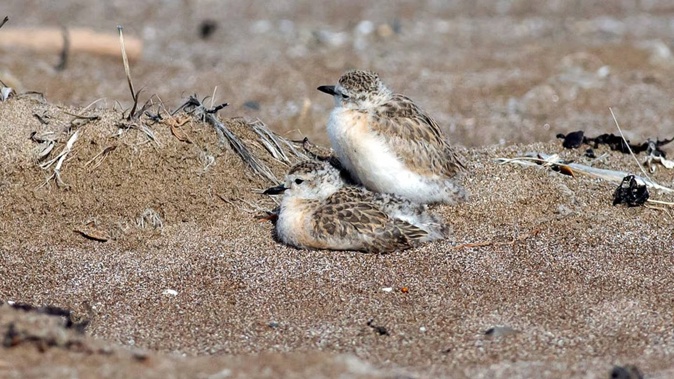
Two dotterel chicks on a popular Northland beach are weeks away from flying off after losing a sibling shortly after they hatched.
Excitement at finding three New Zealand dotterel eggs in a nest at Whangārei’s Sandy Bay in November was tempered after one of the chicks was found dead, in early January, after they hatched on December 28.
Despite the death, residents were delighted the endangered birds were still nesting on the east coast beach.
Dave Gould found the dotterel nest in November and was surprised, but pleased, to see it had three eggs. Dotterel don’t nest at Sandy Bay every year - and last year’s nest only had one egg, that was washed out in the tide so Gould was happy to see three.
Gould contacted another coast resident, Malcolm Pullman, and realising the risk to the nest - it is basically a hollow in the sand with no protection - they built up a fence around it and put up warning signs letting people know about the nest and the dangers to the eggs and subsequent chicks.
Dotterels are considered endangered and in Northland are also known to nest at Mangawhai, Waipu, Ruakākā and Te Arai Stream.
The two dotterel chicks checking on their dead sibling, at Sandy Bay, on Northland’s east coast, last month. The two surviving dotterel chicks are now thriving. Photo / Malcolm Pullman
Gould has been keeping an eye on the two remaining chicks every day and is excited to report that they are doing ”really well” and will be flying off in a week or two.
He visited them again recently and was impressed by how they were doing. They are stretching their wings getting ready to fly.
“As big as they are they still need mum. She was there and they ran to hide under her wings (when he approached). But in a week or two they will fly off, they are doing really, really well,“ Gould said.
“Dogs are the biggest threat to them out here - we don’t have any cats round - and they seem to be pretty aware of that danger. When they see a dog on the waterline they quickly scarper up the beach to get away from them, then if the dogs are up the beach, they run down towards the water to get away.”
And with the chicks so close to flying off, Gould said the safety messages were just as important, if not more so.
“The important message for people [around dotterel nests] is to be careful and keep your dogs under control, and preferably on a lead, to prevent anything bad from happening. And pay attention to, and follow, any instructions on signs around the nests,” he said.
The dotterel chicks are stretching their wings ready to leave their nest on Sandy Bay, on Whangārei's east coast. Photo / Malcolm Pullman
Gould said he had no doubt that fencing the nest off when it was discovered and putting up warning signs saved it, and the eggs, from destruction.
“Having three eggs in a nest that’s basically just a hollow in the middle of the beach during the busy holiday season, they wouldn’t have lasted a week. Now it’s really good to see these two doing so well. I’m pretty sure they are going to make it, which is pretty exciting.“
Gould said the excellent efforts for the Tūtūkākā Land Care group in trapping [predators in the area laid the groundwork for the nest and chicks to survive by getting rid of predators such as stoats.
But it was now incumbent on dog owners to ensure their pets did not kill the two chicks before they left.
The Department of Conservation (DoC) was pleased the community was looking after its nesting dotterels.
“It’s wonderful to see the community taking such an active role in caring for the dotterels at Sandy Bay. It’s hard to say how the dotterel chick died, but it is reassuring to know there weren’t any predator markings around and the weather has been stable, so we can probably rule out those major threats. It is likely that the chick’s death was natural, but it’s hard to say. The remaining chicks appear to be in good health,“ a DoC spokesperson said.
Help protect the threatened New Zealand dotterel:
■ Walk and ride your horse below the high-tide mark on beaches where dotterels are breeding.
■ Stay outside the fenced-off areas with ‘birds nesting’ signs.
■ If you see a dotterel pretending to be injured, or come across eggs or chicks, please leave them alone.
■ Please do not take vehicles on beaches.
■ Keep your dog on a leash at all times. Remember that some beaches are only open for dog-walking at certain times. Check first with your district council
■ Step lightly on the beach.
■ The New Zealand dotterel (Charadrius obscurus ) is a species of shorebird found only in certain areas of New Zealand. It is also called the New Zealand plover or red-breasted dotterel, and its Māori names include tuturiwhatu, pukunui, and kukuruatu.
There are about 2000 of the birds today.
Mike Dinsdale is the editor of the Northland Age who also covers general news for the Advocate. He has worked in Northland for almost 34 years and loves the region.
Take your Radio, Podcasts and Music with you

/cloudfront-ap-southeast-2.images.arcpublishing.com/nzme/EUIOZVRUPZBUVMKHPPNJHFXRCQ.JPG)
/cloudfront-ap-southeast-2.images.arcpublishing.com/nzme/UB6K5TQT4RBUNGACTV46LNOWOE.JPG)








